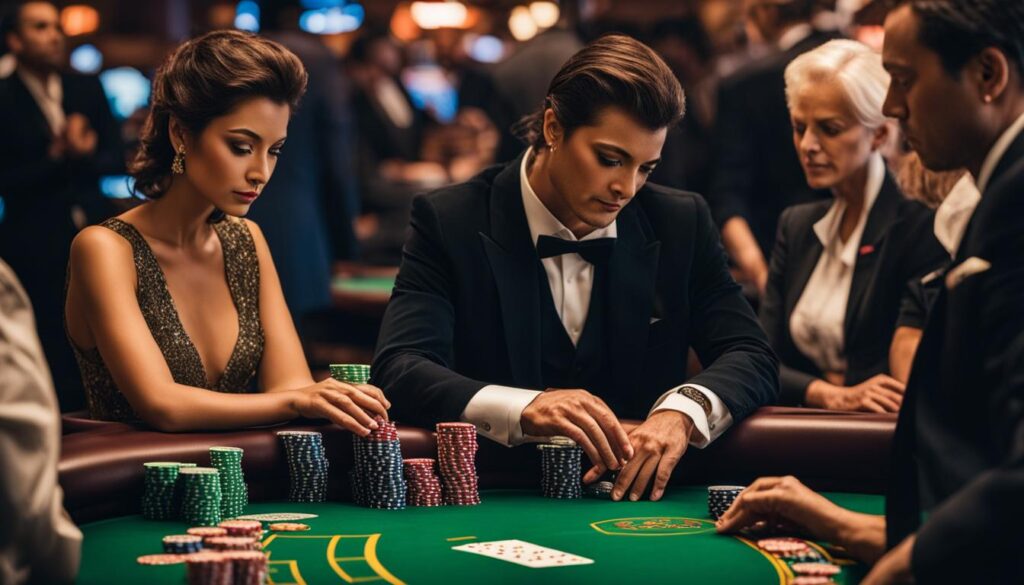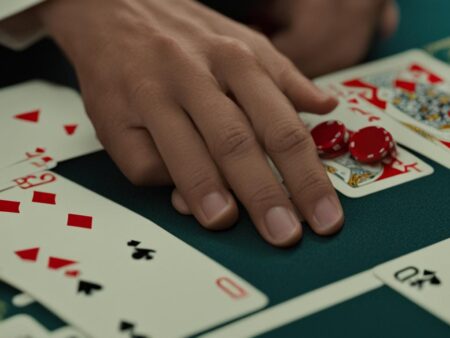The debate between luck and skill in blackjack has long divided players. Some argue that the outcome is purely luck-based, while others believe that skill plays a significant role in the game. In this article, we will explore the factors at play and provide an in-depth analysis to determine whether blackjack is truly a game of luck or skill.
Key Takeaways:
- Blackjack is a game that combines elements of both luck and skill.
- While luck determines the outcome of each hand, skill, strategy, and experience can significantly impact a player’s long-term success.
- The balance between luck and skill varies for each individual player, and personal perception plays a vital role in shaping the overall experience of blackjack.
- The emergence of new technologies, such as AI, and the growing popularity of skill-based tournaments are changing the landscape of blackjack.
- Regardless of the debate between luck and skill, responsible gambling practices should always be prioritized.
The History of Blackjack
Blackjack, also known as 21, has a fascinating history that spans several centuries. The origins of the game can be traced back to French casinos in the 1700s, where it was initially known as “Vingt-et-Un.” The objective of the game was to achieve a hand with a total value closest to 21 without exceeding it.
Over time, blackjack gained popularity across Europe and eventually made its way to the United States. In the early days, the game was not as widespread as it is today, but it gradually caught on and became a staple in casinos worldwide.
One significant development in blackjack’s history was the introduction of card counting techniques by mathematicians such as Edward Thorp in the 1960s. This strategy enabled players to track the ratio of high to low cards remaining in the deck, giving them an edge in making strategic decisions.
Today, blackjack is not only played in brick-and-mortar casinos but has also found its place in the online gambling industry. The game continues to evolve, with variations and new technologies shaping the way it is played. Understanding the history of blackjack provides valuable insights into its evolution and the ongoing debate surrounding luck versus skill in the game.
The Gameplay and Rules of Blackjack
In order to determine whether blackjack is a game of luck or skill, it is important to understand the gameplay and rules of the game. Blackjack is a card game where the objective is to have a hand with a total value closer to 21 than the dealer’s hand, without exceeding 21. Players make decisions based on their current hand and the dealer’s upcard, using strategy and probability calculations to improve their chances of winning.
When playing blackjack, each player is initially dealt two cards face-up, while the dealer receives one card face-up and one card face-down. The value of cards in blackjack is determined as follows: numbered cards are worth their face value, face cards (Jack, Queen, and King) are worth 10, and an Ace can be counted as either 1 or 11, depending on the player’s preference.
After the initial deal, players have several options to choose from. They can choose to “hit,” which means receiving an additional card to improve their hand, or “stand,” which means not receiving any more cards. Other options include “double down,” where the player doubles their bet and receives one additional card, and “split,” which is available when a player’s initial hand consists of two cards with the same value. Splitting allows the player to create two separate hands and play them individually.
The dealer’s actions in blackjack are also governed by specific rules. In most variations of the game, the dealer must draw additional cards (hit) until their hand value reaches 17 or higher. If the dealer’s hand exceeds 21, all remaining players at the table automatically win.
Blackjack Table:
| Hand Value | Action |
|---|---|
| 8 or less | Always hit |
| 9 | Hit except against a dealer’s 3, 4, 5, or 6 |
| 10 or 11 | Double down if your total is more than the dealer’s upcard |
| 12 to 16 | Stand if the dealer’s upcard is 6 or less, otherwise hit |
| 17 or higher | Always stand |
The table above provides a basic strategy guide for players in blackjack. It suggests the recommended actions based on the player’s hand value and the dealer’s upcard. This table can help players make informed decisions and improve their chances of winning.
By understanding the gameplay and rules of blackjack, players can better analyze whether the game leans more towards luck or skill. While luck certainly plays a role in the cards dealt and the outcome of each hand, skillful decision-making and strategic play can significantly increase a player’s chances of success in the game.
The Role of Luck in Blackjack
While skill and strategy are important aspects of blackjack, luck also plays a significant role in determining the outcome of each hand. The order in which the cards are dealt is completely random and based on chance, meaning that players have no control over the cards they receive. This element of luck adds an exciting and unpredictable element to the game.
Probability and odds also come into play in blackjack. Understanding the likelihood of certain card combinations can help players make informed decisions and improve their chances of winning. However, even with knowledge of probabilities, luck can still sway the outcome of a hand. No matter how skilled a player is, there is always a level of uncertainty in each game of blackjack.
It’s important to note that luck can be both a blessing and a curse in blackjack. A lucky draw or streak of favorable hands can lead to significant winnings, but an unlucky run can quickly deplete a player’s bankroll. That’s why it’s crucial to approach the game with a level-headed mindset and to set realistic expectations.
Table: Probability of Winning in Blackjack
| Hand Value | Probability of Winning |
|---|---|
| Less than 12 | 31% |
| 12 – 16 | 38% |
| 17 – 20 | 83% |
| 21 | 100% |
As shown in the table above, the probability of winning varies based on the value of a player’s hand. While having a hand value of 21 guarantees a win, the probabilities decrease as the hand value decreases. It’s essential to keep these probabilities in mind when making decisions in the game, but remember that luck can still influence the outcome.
In conclusion, luck is an integral part of blackjack. While skill and strategy can stack the odds in a player’s favor, there will always be an element of chance in each hand. Understanding the role of luck and incorporating sound decision-making can help players navigate the unpredictable nature of the game and enhance their overall blackjack experience.
Image source: seowriting.ai
The Role of Skill in Blackjack
In the game of blackjack, skill can greatly influence the outcome and increase a player’s chances of winning. While luck plays a role in determining the cards dealt and the outcome of each hand, skilled players can employ various strategies to improve their gameplay and make more informed decisions.
One of the most well-known strategies used by skilled blackjack players is card counting. By keeping track of the cards that have been played, players can gain an advantage and adjust their bets accordingly. Card counting requires practice and a deep understanding of the game, but when done correctly, it can tilt the odds in favor of the player.
Another important aspect of skill in blackjack is employing basic strategy. This strategy is based on the player’s hand versus the dealer’s upcard and provides the optimal move in each situation. By following basic strategy, players can minimize the house edge and make the most statistically favorable decisions.
It’s important to note that skill alone cannot guarantee consistent wins in blackjack. The element of luck is still present, as the cards dealt are determined by chance. However, by honing their skills, understanding probabilities, and employing effective strategies, players can significantly improve their overall performance and increase their chances of coming out ahead in the long run.
The Debate Between Luck and Skill in Blackjack
The debate between luck and skill in blackjack has been ongoing for years. Some argue that the game is purely luck-based, with the order of the cards and the outcome of each hand determined by chance. On the other hand, there are those who believe that skill plays a significant role, as players can use strategic decision-making and employ various techniques to improve their odds of winning.
While luck certainly plays a part in blackjack, skill can greatly influence the outcome of the game. Skilled players understand the importance of using strategy and making optimal decisions based on the current hand and the dealer’s upcard. They may employ techniques such as card counting or follow basic blackjack strategy to gain an advantage.
It’s important to note that the balance between luck and skill in blackjack may vary for each individual player. Some players may rely more on their intuition and luck, while others focus on honing their skills and employing sound strategies. Ultimately, the debate between luck and skill in blackjack is a matter of personal interpretation and experience.
“Luck and skill are two sides of the same coin in blackjack. While luck determines the cards you are dealt, skill gives you the ability to make the most of those cards. It’s a delicate balance, and finding the right mix of luck and skill is what sets successful blackjack players apart.”
The Influence of External Factors
In addition to luck and skill, external factors can also influence the outcome of blackjack games. The overall casino environment, distractions, and even the behavior of other players can impact a player’s decision-making and potentially alter the course of the game. These external factors further complicate the ongoing debate between luck and skill, highlighting the multifaceted nature of the game.
While the debate between luck and skill in blackjack may never be fully resolved, it is clear that both elements play a part in the game. Successful players understand the importance of luck and skill, using a combination of strategic decision-making and a bit of good fortune to maximize their chances of winning. Whether you believe luck or skill is more important, there’s no denying the excitement and thrill that blackjack brings to the table.
| Factor | Luck | Skill |
|---|---|---|
| Order of the cards | X | |
| Outcome of each hand | X | |
| Strategic decision-making | X | |
| Card counting | X | |
| Probability calculations | X |
The Influence of Online Casinos on Blackjack
The advent of online casinos has revolutionized the world of blackjack, offering players a convenient and accessible way to enjoy the game from the comfort of their own homes. Online blackjack games utilize advanced technology, including random number generators (RNGs), to ensure fair and unbiased gameplay. This shift to the digital realm has had a significant impact on the ongoing debate between luck and skill in blackjack.
Online blackjack eliminates some external factors that can influence the outcome of the game in traditional brick-and-mortar casinos. The use of RNGs ensures that the shuffling of cards is completely random, reducing the potential for card counting or other forms of advantage play. While skill-based strategies and decision-making still play a role in online blackjack, the virtual nature of the game levels the playing field and places a greater emphasis on luck.
However, it is important to note that online blackjack still allows players to utilize their skills and make strategic decisions. Players can employ basic blackjack strategy, taking into account their hand and the dealer’s upcard, to improve their chances of winning. Additionally, many online casinos offer live dealer blackjack games, where players interact with real dealers via video streaming. This brings back some of the elements of traditional blackjack, such as reading the dealer’s body language and making strategic decisions based on observed patterns.
| Online Blackjack | Traditional Blackjack | |
|---|---|---|
| Randomness of Card Shuffling | Controlled by RNGs | Dependent on dealer |
| External Factors | Minimized | Can influence decision-making |
| Skill Utilization | Strategic decision-making | Includes reading body language and dealer behavior |
Overall, the influence of online casinos on blackjack has added a new dimension to the debate between luck and skill. While luck still plays a significant role, the virtual nature of online blackjack and the use of RNGs have shifted the balance more towards chance. However, players can still employ their skills and strategies to enhance their gameplay and increase their chances of success. The convergence of luck and skill in online blackjack presents an exciting and dynamic gaming experience for enthusiasts around the world.
The Impact of Legal and Ethical Factors on Blackjack
When it comes to the game of blackjack, legal and ethical considerations play a significant role in shaping the perception of luck and skill. The legality of blackjack varies from country to country, with some jurisdictions categorizing it as a game of skill and allowing its play, while others classify it as a game of chance with legal regulations. Understanding the legal landscape surrounding blackjack is essential for players to engage in the game responsibly and within the bounds of the law.
Ethical factors also come into play in the world of blackjack. Responsible gambling practices ensure that players approach the game with a healthy mindset and set limits to prevent problem gambling. Fair play is another ethical consideration, as players should strive to compete honestly and not engage in any form of cheating or unethical behavior. The ethics of blackjack extend beyond individual players to encompass the broader gaming community, creating a more inclusive and enjoyable experience for all participants.
Overall, the impact of legal and ethical factors on blackjack is significant. Understanding the legalities and ethics surrounding the game allows players to navigate the balance between luck and skill with integrity. By adhering to legal regulations and adopting responsible gambling practices, players can enjoy the game of blackjack while promoting a safe and fair gaming environment.
| Legal Factors | Ethical Factors |
|---|---|
| – Varies by jurisdiction | – Responsible gambling |
| – Game of skill vs. game of chance | – Fair play |
| – Legal restrictions | – Ethical behavior |
The Role of Experience in Blackjack

Experience is a crucial factor in developing skill and improving one’s blackjack game. The more time spent playing and observing the nuances of the game, the better equipped a player becomes in making informed decisions and maximizing their chances of success.
With experience, players gain a deeper understanding of strategy and probabilities. They become familiar with different scenarios and learn how to adapt their gameplay accordingly. This knowledge allows experienced players to make calculated moves and mitigate potential risks.
Furthermore, experience provides valuable insights into the behavior and tendencies of other players. Observing how others approach the game can give players a competitive edge, allowing them to better predict their opponents’ moves and adjust their own strategies.
| Benefits of Experience in Blackjack | Advantages |
|---|---|
| Improved decision-making | Experienced players can make more informed decisions based on their knowledge of strategy and probabilities. |
| Better risk management | Experience helps players assess risks accurately and make calculated bets to minimize potential losses. |
| Enhanced observation skills | Experienced players can analyze the behavior of other players and adjust their strategies accordingly. |
| Adaptability | Experience allows players to adapt to different playing conditions and make adjustments as needed. |
However, it’s important to note that experience alone does not guarantee success in blackjack. Skill development requires a combination of practice, knowledge, and a willingness to continuously improve. Players must remain open to learning and refining their strategies to stay ahead of the game.
New Developments in Blackjack Technology
Technology has constantly shaped and transformed various industries, and the world of blackjack is no exception. With the advent of advanced technologies, such as artificial intelligence (AI) and sophisticated algorithms, the game of blackjack has taken on new dimensions. These developments challenge traditional notions of luck and skill, blurring the line between human expertise and technological capabilities.
One significant development in blackjack technology is the use of AI. AI-powered programs have the ability to analyze vast amounts of data and make near-perfect decisions based on optimal strategies. The algorithms used in these programs continuously learn and adapt to improve their performance over time. This technology has the potential to revolutionize the game, as AI-driven programs can outperform human players in terms of strategy and decision-making.
Another area where technology is making a mark in blackjack is the introduction of online casinos. With online blackjack, players can now enjoy the game from the comfort of their own homes. The use of random number generators (RNGs) ensures fairness and eliminates any potential bias. The digital nature of online blackjack also opens up new possibilities for game variations and innovative features that enhance the overall gaming experience.
As technology continues to evolve, we can expect further advancements in blackjack. Virtual reality (VR) technology, for example, has the potential to create immersive and realistic blackjack experiences. Additionally, blockchain technology could bring transparency and security to the world of online blackjack, addressing concerns about fair play and trust. The future of blackjack is likely to be a fusion of traditional gameplay and innovative technological advancements, adding a new layer of excitement and possibilities to the game.
Advancements in AI:
| Benefits of AI in Blackjack | Challenges of AI in Blackjack |
|---|---|
| Improved decision-making based on optimal strategies | Concerns about eliminating the human element of gameplay |
| Continuous learning and adaptation to improve performance | Potential ethical and legal implications |
| Capability to analyze vast amounts of data quickly | Resistance from players who prefer human interactions |
In summary, technology is shaping the future of blackjack, bringing new possibilities and challenges. AI-powered programs and online casinos have already made significant strides in transforming the game. As technology continues to advance, we can expect further innovations that will redefine the balance between luck and skill in blackjack, while creating new and exciting experiences for players.
The Influence of Skill-Based Tournaments on Blackjack
Skill-based blackjack tournaments have gained significant popularity in recent years, providing players with a unique and competitive gaming experience. These tournaments offer a platform for players to showcase their skills and compete against others with similar levels of expertise. Unlike traditional blackjack games where luck plays a substantial role, skill-based tournaments reduce the element of chance and focus on the player’s abilities and strategic decision-making.
In skill-based blackjack tournaments, players are not only pitted against the dealer but also against fellow participants. This adds an additional layer of competition and complexity to the game. Participants must carefully analyze their opponents’ moves, adapt their strategies, and make optimal decisions to outperform their rivals. The emphasis on skill in these tournaments challenges the notion that blackjack is solely a game of luck.
Competitive blackjack tournaments often feature multiple rounds, with players advancing based on their performance in each round. This format encourages players to continuously refine their skills and strive for improvement. It provides an opportunity to test different strategies, observe the gameplay of other skilled participants, and learn from their successes and failures.
Furthermore, skill-based blackjack tournaments offer attractive prize pools, creating an additional incentive for players to participate and showcase their expertise. The competitive nature of these tournaments, combined with the potential for substantial winnings, contributes to the growing recognition of skill in blackjack and the evolving perception of the game.
Table: Comparison between traditional blackjack and skill-based tournaments
| Traditional Blackjack | Skill-Based Tournaments | |
|---|---|---|
| Role of Luck | Significant | Reduced |
| Player Interaction | Primarily with the dealer | Interaction with opponents |
| Emphasis | Individual gameplay | Strategic decision-making |
| Format | Single game | Multiple rounds |
| Potential Prizes | Varies | Attractive prize pools |
The Future of Blackjack: Luck or Skill?
As the world of gambling continues to evolve, the future of blackjack is poised to undergo significant changes. The question remains: will luck or skill ultimately determine the outcome of this timeless game? We explore the evolving nature of blackjack and how it may shape the gaming landscape in the years to come.
In recent years, technological advancements have introduced innovative elements to the game of blackjack. Artificial intelligence (AI) and advanced algorithms are making their way into casinos, challenging traditional notions of expertise. AI-powered programs can analyze vast amounts of data and make near-perfect decisions based on optimal strategies. This fusion of technology and traditional gameplay blurs the line between luck and skill, creating a new paradigm that pushes the boundaries of the game.
“The future of blackjack may see a fusion of traditional gameplay with AI-powered technologies, creating a new paradigm that combines luck and skill in unique ways.”
Additionally, changing regulations and shifting player preferences may impact the future of blackjack. The legal landscape surrounding the game varies across jurisdictions, with some countries classifying it as a game of skill and others as a game of chance. As attitudes towards gambling continue to evolve, so too may the perception of luck and skill in blackjack. Players and industry stakeholders will need to navigate the intricate balance between chance and strategy in order to adapt to these changes.
Ultimately, the future of blackjack will be shaped by the ongoing debate between luck and skill. While luck plays a role in determining the outcome of each hand, skill, strategy, and experience can significantly influence a player’s success in the long run. The interplay between luck and skill is subjective, varying from player to player. The evolving nature of blackjack will continue to captivate audiences, providing an exciting and unpredictable gaming experience for years to come.
The Importance of Responsible Gambling in Blackjack
Responsible gambling is a crucial aspect that should be prioritized by all players in the game of blackjack. While the debate between luck and skill continues, it is essential to recognize the potential risks associated with gambling and take proactive measures to promote a healthier and more sustainable approach to playing.
Problem gambling can have severe consequences, both financially and emotionally. It is important for players to set limits on their time and money spent on blackjack, ensuring they do not exceed their personal boundaries. Managing one’s bankroll effectively is another key aspect of responsible gambling, as it helps prevent excessive losses and maintains a balanced approach to playing.
If signs of gambling addiction or negative behaviors arise, it is crucial to seek help from professionals or support groups specializing in problem gambling. Recognizing the signs and taking action early on can prevent further harm and provide a path towards recovery.
Responsible Gambling Tips:
- Set limits on time and money spent on blackjack.
- Manage your bankroll effectively.
- Recognize signs of gambling addiction and seek professional help if needed.
- Stay informed about responsible gambling practices and resources available.
By practicing responsible gambling, players can enjoy the thrill of blackjack while maintaining a balanced and mindful approach. Remember, gambling should be seen as a form of entertainment, and responsible behavior ensures a positive and enjoyable gaming experience for all.
| Organization | Website | Hotline |
|---|---|---|
| National Council on Problem Gambling | www.ncpgambling.org | (1-800) 522-4700 |
| Gamblers Anonymous | www.gamblersanonymous.org | N/A |
| BeGambleAware | www.begambleaware.org | N/A |
The Impact of Personal Perception on Blackjack

Personal perception plays a crucial role in how individuals view and approach the game of blackjack. While some may consider it purely a game of luck, others see it as a skill-based endeavor. The subjective nature of blackjack means that each player brings their own beliefs, experiences, and biases to the table, shaping their perception of the game.
For some, blackjack is an exciting game of chance where luck determines the outcome. These players may enjoy the thrill of the unknown, relying on luck to favor them with favorable cards and winning hands. On the other hand, those who view blackjack as a skill-based game emphasize strategy, decision-making, and mathematical calculations to gain an advantage. They believe that skill plays a significant role in the game and that with the right approach and knowledge, they can tilt the odds in their favor.
It is important to acknowledge that both luck and skill are factors in blackjack. The order of the cards, the shuffle, and the luck of the draw all contribute to the outcome of each hand. However, skilled players can use their knowledge and experience to make better decisions, manage their bankroll effectively, and employ strategies to increase their chances of success.
Ultimately, personal perception shapes how players engage with blackjack and influences their overall experience. Some may find joy in the unpredictability of luck, while others seek to hone their skills and improve their odds. Regardless of individual perspectives, blackjack remains a captivating game that blends elements of both luck and skill to create an exciting and challenging gaming experience.
The Influence of External Factors on Blackjack Outcomes
When playing blackjack, the outcome of each hand is not solely determined by luck or skill. External factors, such as the overall casino environment, social dynamics, and player behavior, can influence the course of the game and potentially alter the player’s decisions and overall outcome.
One significant external factor is the presence of distractions. In a bustling casino, players may be surrounded by bright lights, loud noises, and other players engaging in different games. These distractions can divert a player’s attention and affect their ability to make optimal decisions. Additionally, emotions can come into play, as the excitement or frustration of the moment can influence a player’s strategy and decision-making process.
Another external factor is the behavior of other players at the table. A player’s strategy and optimal decision-making may be influenced by the choices and actions of those around them. For example, if a player observes others making risky moves or displaying a lack of skill, it may impact their own approach to the game. Conversely, observing skilled players using effective strategies may inspire others to adjust their own gameplay.
| External Factors | Impact on Blackjack Outcomes |
|---|---|
| Distractions | Can divert attention and affect decision-making |
| Emotions | Excitement or frustration can influence strategy |
| Player Behavior | Observing others’ strategies can impact gameplay |
“The presence of distractions and the behavior of other players can greatly influence a player’s decisions in blackjack. Understanding and managing these external factors is crucial for maintaining focus and maximizing the chances of success.” – Expert Blackjack Player
Being aware of these external factors and learning to manage them can enhance a player’s overall blackjack experience. This includes finding a quiet and conducive playing environment, maintaining emotional control, and focusing on personal strategy rather than being swayed by the decisions of others.
In conclusion, while luck and skill are undoubtedly important in blackjack, external factors cannot be ignored. The casino environment, distractions, emotions, and player behavior all have the potential to affect decision-making and ultimately impact the outcome of the game. By understanding and managing these external factors, players can strive for optimal gameplay and increase their chances of success.
Conclusion
In conclusion, we have delved into the fascinating debate surrounding the role of luck and skill in the game of blackjack. While luck certainly plays a part in determining the outcome of each hand, skill, strategy, and experience also contribute to a player’s long-term success. It is a delicate balance that varies for each individual, with personal perception shaping the overall experience of the game.
Throughout our exploration, we have discovered that blackjack is a game that combines elements of both luck and skill. The order in which the cards are dealt and the luck of the draw are beyond a player’s control, but the decisions they make based on their hand and the dealer’s upcard can significantly influence their chances of winning. Skilled players who employ strategies like card counting and basic blackjack strategy have a higher likelihood of long-term success.
The emergence of online casinos, new technologies, and skill-based tournaments has added new dimensions to the blackjack landscape. While digital advancements like AI-powered programs can challenge traditional notions of expertise, they also offer opportunities for players to showcase their skills in competitive environments. However, it is important to remember the importance of responsible gambling and maintaining a healthy approach to blackjack and any form of gambling.
In summary, the debate between luck and skill in blackjack is complex and ongoing. While the element of luck cannot be denied, the role of skill in the game should not be underestimated. Blackjack is a game where strategy, decision-making, and experience can significantly impact a player’s success. Whether you believe luck or skill is more dominant, the ultimate goal is to enjoy the dynamic and thrilling experience that blackjack offers.
FAQ
Is blackjack purely based on luck?
No, while luck plays a significant role in determining the outcome of each hand, skill and strategy can greatly influence a player’s success in the long run.
Can skill improve a player’s chances of winning in blackjack?
Yes, skilled players can employ strategies such as card counting and use basic blackjack strategy to make optimal decisions, improving their chances of winning.
How much does luck factor into online blackjack?
Online blackjack games use random number generators (RNGs) to shuffle the cards, ensuring fairness and randomness. While players can still employ strategies, the digital environment eliminates external factors such as card counting.
Is blackjack legal everywhere?
The legality of blackjack varies depending on the jurisdiction. Some countries consider it a game of skill and permit its play, while others classify it as a game of chance with legal restrictions.
How important is experience in blackjack?
Experience is significant in developing skill and understanding the nuances of blackjack. Seasoned players often have a deeper understanding of strategy, probabilities, and the behavior of other players.
How are advancements in technology impacting blackjack?
New technologies such as artificial intelligence (AI) and advanced algorithms are introducing innovative elements to the game. AI-powered programs can analyze data and make near-perfect decisions, challenging traditional notions of expertise.
Do skill-based blackjack tournaments eliminate luck?
Skill-based blackjack tournaments provide a platform for players to showcase their abilities and compete against others with similar skill levels. While luck still plays a minor role, outcomes are primarily determined by skill rather than chance.
What does the future hold for blackjack?
The future of blackjack will continue to evolve, influenced by technology, regulations, and player preferences. The ongoing debate between luck and skill will persist as players navigate the balance between chance and strategy.
How important is responsible gambling in blackjack?
Responsible gambling practices are crucial in ensuring a healthier and more sustainable approach to blackjack and any form of gambling. Players should set limits, manage their bankroll effectively, and seek help if they develop signs of gambling addiction.
Can personal perception influence a player’s experience in blackjack?
Yes, each player’s perception of blackjack is influenced by their individual experiences, beliefs, and biases. Personal perception shapes the way players approach blackjack and can impact their overall enjoyment and engagement with the game.
Do external factors affect blackjack outcomes?
Yes, external factors such as distractions, emotions, and the behavior of other players can influence decision-making and potentially alter the outcome of the game. Understanding the influence of external factors provides insight into the interplay between luck, skill, and the gaming environment.







